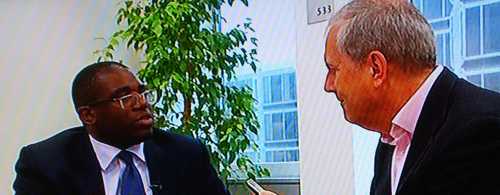
It came as a bit of a shock this evening, when BBC1’s The One Show started talking about Twitter, that reporter Gyles Brandreth’s first port of call was Kingsgate House on Victoria Street, home of DIUS and minister David Lammy. With traffic up by a factor of three this year already, Twitter’s certainly a hot topic at the moment – with the BBC in particular facing accusations of going overboard; but where does David Lammy come into all this?
To be entirely fair, Lammy did talk (some of) the talk:
For me, it’s almost a broadcast means of people knowing what I’m up to during the course of the day. It is about finding ways in which people can be clearer about what government ministers are up to.
OK, so it would have been nice if he’d described it as a two-way thing – and of course, he may well have done, but that wasn’t the soundbite we heard. But nice to get the potential for political transparency on the record.
The only niggle is that Lammy has been a member of the Twitter family since mid-December. He hasn’t even reached three figures for the number of tweets. Indeed, he’s only been using it with any head of steam for a month. One can’t help feeling it was a nice ‘soft’ primetime TV appearance for a politician with ambition: the caption read ‘Minister, Dept for Innovation’, and it can’t have done any harm to put a government minister in a story about something ‘cutting edge’ and ‘cool’.
Speaking of Twitter: I see @downingstreet has now reached the Twitterholic Top 50, and looks like going even higher – they’ve already passed the MarsPhoenix Lander, one of Twitter’s iconic accounts. Between you and me, I’m told they have MC Hammer in their sights.